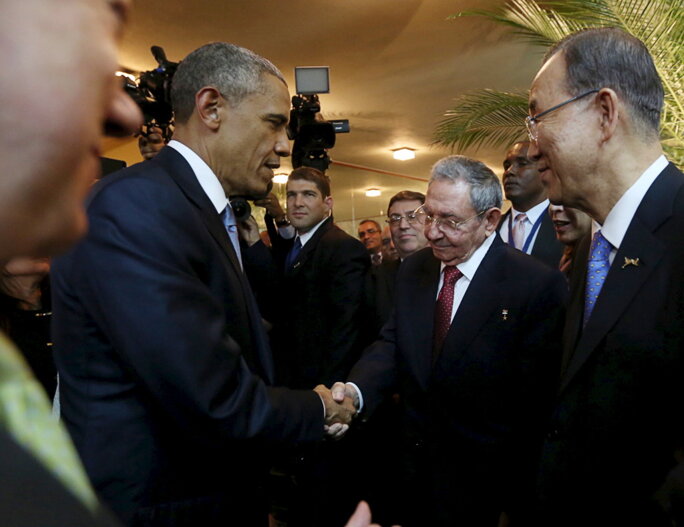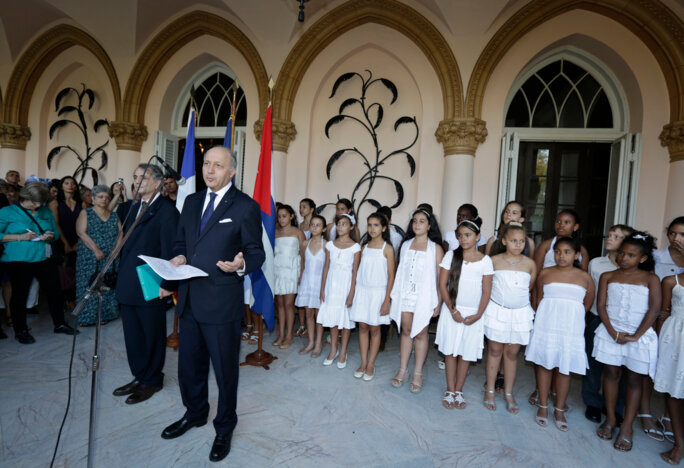When US President Barack Obama shook hands with Cuban leader Raúl Castro at a Summit of the Americas meeting in April this year, following the announcement last December that their two countries were to normalise relations, there was no doubt the moment was, as Obama described it, “historic”.
It may be far less momentous, but François Hollande also made history on Monday when he became the first French president in office to visit Cuba. For while French king Louis-Philippe, who reigned between 1830 and 1848, and the late socialist president François Mitterrand both made the trip, the former did so before reaching the throne and the latter did so seven years before becoming president. Hollande has also become the first acting European head of state to make an official visit to the island, if one excludes that of Pope John Paul II in January 1998.
For the Castro regime, Hollande’s presence is one further stage in its new-found normalization on the international scene. For France, the visit represents an important opportunity to advance its political and economic interests in both the Caribbean region and in Latin America.
The one-day visit (which officials in Paris underlined is a two-night stay) is a relatively minor event with regard to December’s spectacular rapprochement between Cuba and the US, and coming just weeks after the historic handshake between Barack Obama and Raúl Castro.
But there is nothing the Elysée Palace, the French presidential office, dislikes more than the accusation of running behind in Washington’s tracks. Several French diplomatic sources told Mediapart that Hollande’s trip was decided upon before Obama and Castro’s joint declaration.

Enlargement : Illustration 2

But nevertheless, the announcement that the French president would visit Cuba came afterwards. It was as if, once again, Hollande prefers to stay under cover, even if that leaves him open to appearing second fiddle to the more powerful and more courageous. “We are going there as a partner of Cuba, to accompany Cuba’s evolutions and to underline the regional importance for the Caribbean,” said one Elysée official, speaking on condition his name was withheld. “But it would be absurd to play one-upmanship with the United States. It is not comparable. No kind of rivalry should be read into this.”
While it is indeed obvious that France cannot compete with the US in its relations with Cuba, it nevertheless has historic ties to build upon. The French cultural centre, l’Alliance Française, was, on Che Guevara’s request, the only foreign institution of the sort not to be closed down after Fidel Castro’s arrival in power in 1959. France has since 1991 systematically voted within the United Nations for an end to the US-imposed embargo on Cuba. Since 2008, it has taken a leading role, along with Spain, in attempting to open up dialogue between Havana and the European Union which, beginning in 1996, made commercial and economic agreements with Cuba conditional to it restoring human rights. That dialogue finally picked up again last year, after it was widely acknowledged that the isolation of Cuba served little effect – the regime remains intact despite Fidel Castro’s absence from the stage – and also the recognition that Raúl Castro’s signals of a more open approach deserved support.
It was for that reason that French foreign minister Laurent Fabius travelled to Havana in April 2014, the first visit to Cuba by a French foreign minister since that of Claude Cheysson in 1983, two years after the election of the late socialist president François Mitterrand. Until last year, Fabius, who served as Mitterrand’s second prime minister between 1984 and 1986, appeared more than a little reticent about contact with the castro regime. In June 2003, he wrote an opinion article in French weekly magazine Le Nouvel Observateur in which he called for an end to the “strange indulgence towards Fidel Castro” displayed in French political and intellectual circles. “Dictatorships are neither of the Right or the Left; they are loathsome”, he wrote at a moment dubbed the ‘black spring’ of Cuba, when 75 political opponents of the Havana regime were imprisoned (and who have since been released).
But after his appointment as foreign minister immediately after the election of François Hollande in May 2012, his opinion appears to have mellowed. “Since 2012, he became convinced that [the situation in] Cuba would move,” a French diplomatic official, whose name is withheld, told Mediapart. “The belief was that this situation which came from the Cold War could not continue.” Fabius’s diplomatic network has for some while knotted relations, some very strong, with both the Cuban regime and civil society. Thanks to the contacts that French ambassador to Cuba, Jean Mendelson, has among the Cuban clergy, the envoy was able to inform Paris of the imminence of a formal rapprochement between Havana and Washington before it was announced. Fabius has been submitted several reports by specialists of the region which underline the Cuban regime’s capacity for endurance and which, they argue, is unlikely in the short term to suffer the same fate as the old Arab dictatorships swept by revolutions in 2011.
That is also the opinion of socialist Senator Jean-Pierre Bel, the former president of the upper house who now acts as a personal envoy of François Hollande with Latin American and Caribbean states. Bel has for some while argued for a rapprochement with Cuba, which he visits frequently. “It’s in our interest to accompany the changes rather than remaining in a doctrinal position which improves nothing for the situation of the Cubans,” he told Mediapart in April, after returning from a visit to Cuba to prepare Hollande's visit. “The things about human rights must be said - and we do that - and not turn our back on Cuba, in order to contribute to its development.”
French business also argues for a rapprochement with Cuba. Foreign minister Laurent Fabius well understands that to increase France’s presence in Latin America, an aim which has been made a priority since Hollande’s election in 2012, Cuba is key. “Fabius has travelled a lot to Latin America, France had catching up to do, including on the economic front,” commented one source close to the minister, speaking on condition his name was withheld. “But even for [establishing] commercial exchanges with the other countries, Cuba remained a lock to be broken.” A specialist of the region whose name is also withheld, agreed: “There is no Latin American policy without Cuba.”

Enlargement : Illustration 3

Another factor at play here is the economy of France’s two islands in the Caribbean, la Guadeloupe and la Martinique, and Paris is keen to develop ties between them and the whole of the area. In early April, French consortium CMA-CGM won a 30-year concession agreement to operate the container terminal in Jamaica’s port of Kingston, involving massive investment to upgrade and expand the port.
Indeed, Hollande’s trip to Cuba is part of a six-island whirlwind trip across the Caribbean, taking in the French islands of Guadeloupe and Martinique, the French overseas collectivity Saint-Barthélemy, the Franco-Dutch island Saint Martin, Cuba and Haiti (where he will, as in the case of Cuba, be the first French president to make an official visit).
In Havana, the talks centre on three main themes; economic exchange, cooperation in the scientific and higher education fields, and cultural exchange, marked by Hollande’s inauguration of new buildings for the Alliance Française. “Cuba is inviting foreign investment,” said Hollande’s special envoy Jean-Pierre Bel, “and if we don’t do anything the North Americans will be everywhere.” Several large French companies are already present on the island, including construction firm Bouygues, wines and spirits group Pernod-Ricard and hotel group Accor, while Air France runs two flights per day between Havana and Paris.
In exchange for developing trade with Cuba, Havana wants to see progress in a renegotiation of around a third of the total Cuban debt, or about 5 billion dollars. France presides the Paris Club, the informal group of creditor countries which seeks to ease debt burdens in poorer countries, and the sum represents Cuban debt owed to France. French foreign trade junior minister Matthias Fekl and French Treasury director Bruno Bézard, mandated by the Paris Club to lead the negotiations, had travelled to Cuba in March to discuss the issue in advance of the visit.
Hollande also wants the French development agency, the AFD, to invest in projects in Cuba, which for the moment is blocked by the conditions imposed on Cuba’s debt repayments. Hollande and Castro were also expected to seek common ground on environmental issues, ahead of France’s hosting in December of the United Nations Climate Change Conference.
No joint press conference was planned during Hollande’s visit to the island, as is often the case during the French president’s foreign tours, and it is considered unlikely that any statement on human rights will be made. The only figure from civil society on Hollande's scheduled meetings was Cardinal Jaime Ortega, head of the Cuban Catholic Church, during a ceremony to award him the Légion d’honneur. Ortega, 78, who was interned in a military work camp for eight months in 1966 (a fact not mentioned in the press information pack distributed by the Elysée) is today a key figure in the rapprochement between the Havana regime and the Catholic Church.
-------------------------
The French version of this article can be found here.
English version by Graham Tearse


